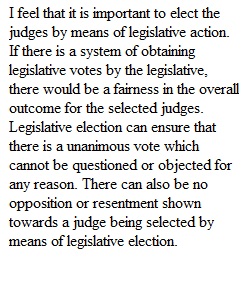


Q Welcome to week five's discussion, where we'll be talking about how judges actually become judges. Note that this week's deadlines are extended due to the Independence Day holiday. Please make an initial response to the below question by Thursday 9/19, and respond to at least three classmates' posts by Saturday 9/21. Responses to an ongoing thread may count toward your three replies. In making your posts, please bear in mind the following: 1. All posts should be respectful and professional and use language appropriate for an academic environment. 2. While I do not prohibit discussion of political and social issues as these are often closely linked with criminal justice issues and merit our attention, please constrain your comments to the assigned question and remain respectful. Comments should focus on substantial and honest critiques of policy rather than attacks on political opponents. 3. You do not have to cite sources for discussion posts but may do so if you wish. Sources for discussion posts do not have to be scholarly but must be reputable. The Onion is not a reputable source. The New York Times or Wall Street Journal is. If you are unsure whether a source is appropriate, please ask. 4. You must complete all four posts (Initial response and three replies) to receive any credit for discussion assignments. Our reading this week discusses the five methods of appointment and/or election for judges. Which of these do you consider the best option, and why?
View Related Questions